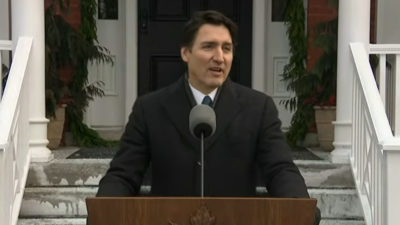Canada’s Justin Trudeau on Monday finally announced his resignation as both the Prime Minister and the leader of Liberal Party after days of suspense amid intensifying pressure on him to step down. He made the announcement during an address which was expected for a long time.
“Over the holidays I had time to reflect,” he said before announcing the decision.
“I intend to resign as party leader, as Prime Minister after the party selects its next leader…Last night I asked the president of the Liberal Party to start that process,” Trudeau said adding, “he will leave office as soon as the ruling Liberal party chooses a new leader.”
Trudeau was facing criticism over a range of issues including the soaring cost of food and housing. He maintained silence in recent weeks amid growing calls to step down and the sudden resignation of the finance minister on December 16.
Initially celebrated for restoring Canada’s liberal values upon his 2015 election, the 53-year-old leader’s popularity has significantly declined. This political crisis arrives at a challenging time for Canada.
As he stepped down, the Liberal party is facing a leadership vacuum mere months before the upcoming legislative elections, due by October’s end.
Recent months have seen Trudeau’s support diminish, with his government barely surviving no-confidence votes while facing calls to step down.
Despite his commitment to lead the Liberals through elections, he faced additional challenges from US president-elect Donald Trump, who has proposed a 25-percent tariff on Canadian imports.
A significant blow came in December when Deputy Prime Minister Chrystia Freeland resigned over disagreements regarding Trump’s proposed actions, marking the first public cabinet opposition to Trudeau.
In response to political instability, Trudeau implemented substantial cabinet changes, replacing one-third of his team that month.
His November visit to Trump at Mar-a-Lago aimed to prevent trade disputes. Trump has subsequently criticised Trudeau on social platforms, referring to him as Canada’s “governor” and supporting the notion of Canada becoming America’s 51st state.
After his 2015 victory, Trudeau secured additional electoral wins in 2019 and 2021. Current polls show him trailing Conservative Pierre Poilievre by 20 points.
Justin Trudeau, firstborn of former prime minister Pierre Trudeau who passed in 2000, entered politics after various careers including snowboard instruction, bartending, security, and teaching.
His political career began in 2008 as a Member of Parliament representing a Montreal working-class constituency. His prime ministerial achievements include Senate reform, negotiating a US trade agreement, and implementing carbon taxation to reduce emissions.
Additionally, he legalised cannabis, initiated investigations into Indigenous women’s disappearances and deaths, and introduced legislation for medical assistance in dying.




